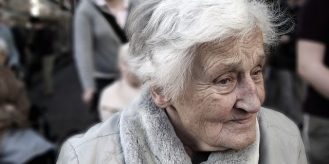In 1974, Israel was beginning a transition from a very young to an older society—a transition that caught Israel’s social service system unprepared.
From the start, the Center for Research on Aging established itself as a valuable resource by raising national awareness of the changes that Israel was undergoing and their implications.
Developing Community Services
MJB’s path-breaking analyses—including the first national projections of elderly with disabilities and their service needs—contributed to a national reassessment of the challenges facing the country and a realization of the urgent need for community-based services for this rapidly growing elderly population.
The Center’s research catalyzed a decade of intensive service and policy development. By the end of the 1980s, a Long-term Care Insurance Law revolutionized home-based care for elderly with disabilities. MJB played a key role in the development and passage of this law, which now benefits 160,000 elderly Israelis annually.
One of the key services developed by JDC-ESHEL at this time was day centers for elderly with disabilities, which became a central component of the national system of community-based care. MJB accompanied the development and expansion of this service from the start, and has since gone on to accompany other important services developed by JDC-ESHEL.
MJB’s research in these early years also helped to put the issue of quality of care on the agenda in a new way. For example, a national study of quality of institutional care for the elderly in the early 1980s exposed serious deficiencies, and led to the revision of the standards and the creation of better regulatory systems of enforcement. .jpg)
Elderly Immigrants
In the early 1990s, the massive immigration from the former Soviet Union raised many challenges, including how to address the unique needs of the many elderly and older adults who came with few resources and multiple health problems. MJB helped Israel to develop a master plan for institutional and community services, preventing what could have been a serious crisis in the country’s ability to serve the older immigrants and all of Israel’s elderly.
A National Database
To consolidate our role in providing key information to plan and monitor the development of needs and services, early on MJB established MASHAV, a national database on the elderly and the social service system, implemented in cooperation with JDC-ESHEL.
Since 1997, MASHAV has regularly published a comprehensive Statistical Abstract on the Elderly, now supported by the Maurice and Vivienne Wohl Charitable Foundation. The Abstract provides an essential knowledge base for policymakers and service planners to make informed decisions about the needs of the elderly and the policy and program solutions being developed for them.
New Demographic Transition
The Institute is now playing a central role in Israel’s national efforts to address yet another demographic transition. Over the next twenty years, Israel’s elderly population is expected to reach 1.66 million—a 92% increase from 2013. Coupled with continually rising life expectancies, the demand for health and social services will increase dramatically.
In 2011, in conjunction with the National Institute for Health Policy Research, MJB chaired and organized the annual gathering of leaders from Israel’s health system, which focused on the health and social implications of this population increase. Three of MJB’s reports identifying this implications of the projected changes provided the information base for the conference, which issued a series of policy documents to guide Israel’s effort to address this challenge. The transition has brought to the fore several key issues that MJB is pursuing.
End-of-life care
Over the last decade, MJB worked with the Jewish Federations in Detroit and New York and with JDC-ESHEL to carry out a series of studies that provided a national perspective on these issues and evaluated some of the early initiatives to develop effective service models in Israel. (This research was supported by MJB and JDC Board members Irv Smokler and Nora Barron.) The studies documented the difficulties that the elderly and their families experienced with end-of-life care, and the attitudes of key health care providers. They demonstrated the positive impacts of the initial efforts to promote palliative and hospice care. Furthermore, they explored the legal framework governing the rights of the elderly and their families in end-of-life care decisions within the health care system. This body of research contributed to the gradual development of these services and to the Ministry of Health’s 2009 development of guidelines for the health care system to provide palliative care in the community, hospitals, and long-term care institutions.
The challenge of end-of-life care continues to be a major focus of our research program. Of particular importance is the professional support MJB is providing to a JDC-ESHEL-led national committee to develop a new national plan for end-of-life care.
Dementia: “The New Epidemic”
In 2013, Israel adopted its first national inter-ministerial strategic plan for addressing the challenges of dementia. The plan was developed at the initiative of the Institute and the Helen Bader Foundation, and the planning process was led by MJB. Following the plan’s national launch, an implementation committee was established. MJB continues to work closely with this committee, supporting its work and monitoring the progress. At the same time, MJB is continuing to pursue research on critical issues related to effectively addressing this challenge, with the support of the Helen Daniels Bader Fund at the Bader Philanthropies.
Redefining Retirement Patterns
The demographic transition significantly highlights the importance of expanding the role of older workers in the labor force and of postponing the retirement age. This is critical to the quality of life of the elderly and to society’s economic capacity to deal with these challenges. Over the years, MJB has been involved in addressing these issues, including the government’s 2004 decision to raise the retirement age. In light of recent trends, we are now pursuing new studies of how to promote employment opportunities for the elderly, in cooperation with JDC-TEVET, JDC-ESHEL, and the Social Security Administration.
.jpg)
Promoting International Exchange
Throughout our 40 years, MJB has made a consistent effort to share Israel’s experiences with the global community and to bring the best international practices to bear on Israel’s social policy development.
One focus has been on the global Jewish community. For example, in 1985, MJB initiated and hosted the first of a series of international conferences to address aging in the Jewish world. As background to this initial conference, we conducted the first and only worldwide survey of Jewish communal strategies dealing with the elderly.
Over the years, MJB has also carried out major research for JDC to promote services for the elderly in Jewish communities around the world. Today, we are serving as the professional resource for a JDC initiative to implement an organization-wide policy on measurement and evaluation that will include its extensive work with the elderly.
The Center has also worked with Jewish social service organizations internationally on issues of common interest. One recent example is a professional exchange with Jewish Care, the United Kingdom’s largest social service agency for the elderly, that included high-level study tours to the UK and Israel. For Jewish Care’s Executive Director Simon Morris, the exchange with MJB enabled his organization “to learn, develop, and share knowledge and experience across the global Jewish community.”
A second focus has been on the broader international community. In the early 2000s, the World Health Organization turned to MJB to lead a path-breaking international process of developing long-term care policies, in light of rapid aging around the world. The result was a series of reports that guided the expansion of such policies in developing countries.
The Institute also promotes international exchange through our cooperation with the Ministry of Foreign Affairs’ Agency for International Development Cooperation. MJB regularly hosts international delegations to share knowledge about Israel’s social service system. Recent visits have included the government of Vietnam coming to learn about programs to enable aging-at-home, and senior policymakers and service professionals from developing countries in Asia, Central America, and Africa to learn about ways of preventing elder abuse. MJB also contributes to Israel’s participation in key United Nations’ commissions addressing social issues.
Integrated care
Today, we are intensively involved in a national initiative led by JDC-ESHEL to create more integrated long-term care services in Israel, part of a larger trend within the social service and policy world to look for integrated solutions to the challenges of services for the elderly. MJB is ideally positioned to help find these solutions with our ability to understand both the complex needs of the elderly and the barriers to effective service that can exist within service systems—all with an international perspective that draws on the best knowledge from around the world.



